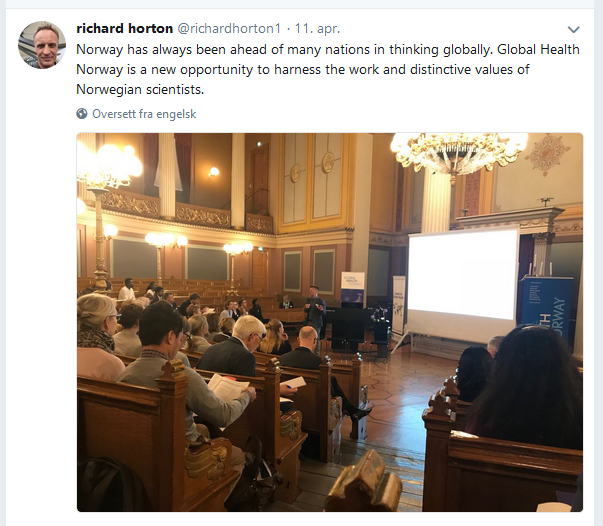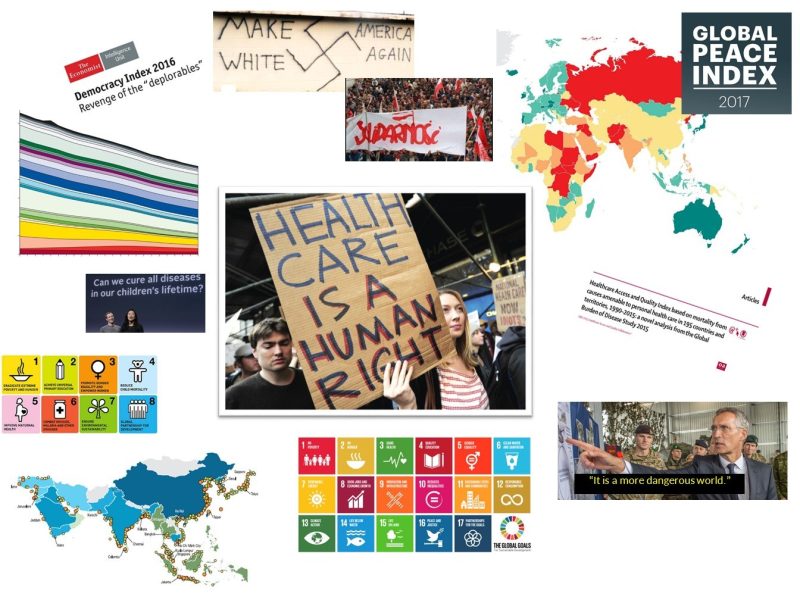Concluding lecture at the Global Health Norway conference 2018 given by Lancet Editor-in-Chief, Richard Horton.

Horton began by asserting that health care is a human right. He continued by stating that he would like to look at health system strengthening from a different perspective. His talk gave conference participants an experience that was insightful, challenging, reflective, informed, and inspiring.
Some highlights included:
- All roads lead to Universal Health Care
- Immigration has been ongoing since the dawn of humankind – we are wanderers!
- We need to see beyond health – peace, democracy, the planet
- Individuals vs community
- Global health & solidarity
- Putting human development at the heart of the debate
- Communicating – conversation is the essence
Richard Horton Health for All Reading List
Ivan Krastev, After Europe, 2017
Aimé Césaire, Discourse on Colonialism, 1972 (1955)
Margaret Atwood, The Handmaid’s Tale, 1985
Michel Houellebecq, Submission, 2015
Francis Bacon, New Atlantis, 1627
John Rawls, The Law of the Peoples, 1993
Amartya Sen, The Idea of Justice, 2009
Paulo Freire, Pedagogy of the Oppressed, 1968 (1970)
Madame de Stael
Ngugi wa Thiong’o, Secure the Base, 2016
“Health inequalities should be an important part of the argument to change our national and global discussion from one that gives priority to economic growth to one that puts human development at the heart of the debate.”
Lancet 2015; 386; 2442-44
What is the present condition of scientific communication?
Horton shared some confessions …
- We defend the importance of human rights, but we too often mean the defence of our rights over those of people living in less fortunate settings
- We abhor the extremism of others as inimical to our values, customs, and traditions, but we often disregard the extremism of our own intolerance and prejudice
- We revere, protect, and seek to strengthen individual agency and responsibility, but we pay far less attention to the strong social forces shaping our choices and behaviours
- We oppose the injustices we see around us, but we too often fail to think about, let alone articulate, what a truly just world would look like
- We wring our hands about the threat of a post-truth world, but we have long chosen not to see the brutal facts and realities of the lives lived by others next to us
Does global health and global health science support human solidarity?
Horton’s suggestions of what we can do …
- Radically redefine our notion of “we”—extend our global conversations to strengthen our social relatedness, our communities, and the circumference of our lives and concerns (Attack the institutional racism of global health, global health science, and scientific publishing)
- Initiate a new era of descriptive science and storytelling—imaginative identification with the lived experiences of individuals and communities, about what we share in pain and humiliation (The Lancet will soon launch a new series on Global Health Narratives)
- Create new movements—in countries and globally—for solidarity through novel alliances, broader political participation, education, and universal health coverage (Put the HUMAN into UHC)
- Liberty—especially liberty of conscience, speech, and the press— must be included and promoted as a core value of global health, in addition to equity and justice
“He who would put security before liberty deserves neither.” Benjamin Franklin
Richard Horton was interviewed following his talk:
- What knowledge do we need to prepare us for the current and future challenges in Global Health?
- How do we synergise, align and corroborate our current knowledge to improve our systems, governance and world health?
- The current focus of investment for different high-income countries tends to be unidirectional, how could this be leveraged to improve health in the most efficient and beneficial way for the global community?
- How do we radically redefine our notion of “we” so it extends our global conversations to strengthen our social relatedness, our communities, and the circumference of our lives and concerns?
Listen to a podcast of his interview. (Read a summarised transcript)

